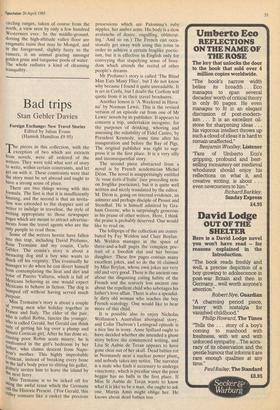Bad trips
Stan Gebler Davies
Foreign Exchange: New Travel Stories
Edited by Julian Evans (Hamish Hamilton £9.95)
The pieces in this collection, with the exception of two which are extracts from novels, were all ordered of the writers. They were told what sort of story to write, within certain constraints, and let get on with it. These constraints were that the story must be set abroad and ought to have a strong sense of place.
There are two things wrong with this formula. The first is that it is insufficiently limiting, and the second is that an invita- tion was extended to the sloppier sort of writer to indulge in travelese, the style of Writing appropriate to those newspaper Pages which are meant to attract advertise- ments from the travel agents who are the only people to read them.
, Some of the writers herein have fallen Into this trap, including David Profumo, Rose Tremaine and my cousin, Carlo Gebler. The cousin's story is about a Menacing dog and a boy who wants to shuck off his virginity. This eventually he Manages to do when he can divert himself from contemplating the heat and dirt and noise of Puerto Vallarta, which is full of Mexicans behaving as one would expect
bumped to behave in fiction. The dog is pumped off without having served much Purpose.
Miss Tremaine's story is about a couple of young men who holiday together in Prance and Italy. The elder of the pair, Who is called Robin, fancies the younger, Who is called Gerald, but Gerald can think ,11,1Y of getting his leg over a plump and mrsute Corsican girl, After he has done so, causing poor Robin acute misery, he is confronted in the girl's bedroom by her father, who claims descent from Napo- leon's mother. This highly improbable Corsican, instead of breaking every bone to the lad's body prior to slitting his gullet, Politely invites him to leave the island by the next ferry. Miss Tremaine is to be ticked off for using the awful tense which the Germans call the Historic Present. (Tor Gerald, this valley contains like a casket the precious
possessions which are Palomina's ruby nipples, her amber arms. His body is a slow avalanche of desire, engulfing, obliterat- ing.' And so on.) The French can occa- sionally get away with using this tense in order to achieve a certain froglike poetic- ism, but it is effective in English only for conveying that stupefying sense of bore- dom which attends the recital of other people's dreams.
Mr Profumo's story is called 'The Blind Man Eats Many Flies', but I do not know why because I found it quite unreadable. It is set in Corfu, but I doubt the Corfiots will quote from it in their travel brochures.
Another lemon is 'A Weekend in Hava- na' by Norman Lewis. This is the revised version of an episode cut from one of Mr Lewis' novels by its publisher. It appears to concern a trip, undertaken incognito, for the purposes of drinking, whoring and assessing the reliability of Fidel Castro, by President Kennedy, some time after his inauguration and before the Bay of Pigs. The original publisher was right to sup- press it in the first place. It is a very silly and inconsequential story.
The second piece abstracted from a novel is by French academician Michel 'Non. The novel is unappetisingly entitled 'Je vous ecris d'Italie' (see preceding note on froglike poeticism), but it is quite well written and nicely translated by the editor.
M. Deon is, going on internal evidence, an admirer and perhaps disciple of Proust and Stendhal. He is himself admired by Gra- ham Greene, who is surprisingly generous in his praise of other writers. Here, I think the praise is probably deserved. One would like to read on.
The lollipops of the collection are contri- buted by Fay Weldon and Clare Boylan.
Ms Weldon manages in the space of three-and-a-half pages the complete por- trait of a Swedish slut and her bovine daughter. These few pages contain many excellent jokes, and so do the 16 claimed by Miss Boylan, whose own jokes are very old and very good. There is the ancient one about the disgusting eating habits of the French and the scarcely less ancient one about the repellent child who sabotages his father's love affair. There is also a spendid- ly dirty old woman who teaches the boy French scatology. One would like to hear more of this child.
It is possible also to enjoy Nicholas Wollaston's Australian aboriginal story, and Colin Thubron's Leningrad episode is a nice line in irony. Anne Spillard ought to have decided whether she intended a ghost story before she commenced writing, and Lisa St Aubin de Teran appears to have gone clear out of her skull. Dead babies rot in Normandy near a nuclear power plant and nobody takes any notice. The narrator is a male who finds it necessary to undergo vasectomy, which is peculiar since the poor beggar has no balls in the first place. If Miss St Aubin de Teran wants to know what it is like to be a man, she ought to ask one. Martin Amis might oblige her. He knows about dead babies too. •














































 Previous page
Previous page